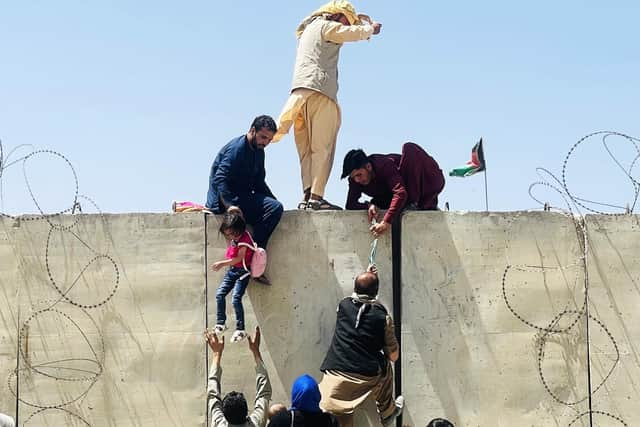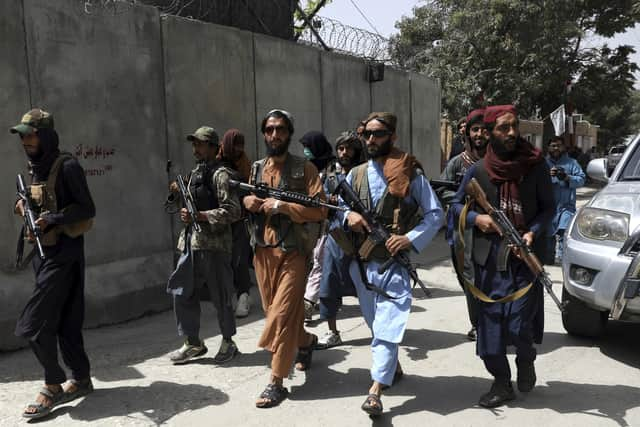My fears for the women and girls of Afghanistan as the Taliban return: Jayne Dowle
I woke up to the sight of bearded fighters riding through the suburbs of the city on the back of trucks, brandishing machine guns. The trucks seemed significant. Not tanks and air support – the Taliban have no planes – but one group of people wielding raw force directly over another group of people.
And the weight of Western military might in retreat and powerless to stop it. Appalled, and with tears rising in my eyes, I went downstairs, switched on the news in the living room and drank my coffee in silence watching the smoke rising and the helicopters desperately ferrying people to the relative safety of the airport.
Advertisement
Hide AdAdvertisement
Hide AdI overheard my teenagers in the kitchen. “Mum’s got the news on, is it really serious?”, whispered my 15-year-old daughter, Lizzie to her brother. “Is it going to affect us?” asked 19-year-old Jack, who came into the living room looking worried. The answer, to both questions, is yes. Our lives in the United Kingdom, already changed irrevocably by the tragedy of the coronavirus pandemic, which has resulted in excess of 100,000 deaths and draconian impingements on personal freedom, will be recalibrated yet again by the outcome of Taliban rule.


Kabul might be 5,000 miles away from Yorkshire, but this distressing turn of events as Nato and US forces withdraw after 20 years of fighting, peacekeeping and education, echoes across the steppes and mountains to our door. The world has shifted on its axis with an alarming lurch; as Western diplomats flee Kabul for safety, the Chinese and Russian embassies remain open. There are implications here which we are yet to understand, but cannot ignore. The miscalculation of Western leaders, that odd speech of US President Biden and the so-far shambolic approach of our own government to the crisis lays our geopolitical vulnerabilities wide open.
We must reconsider not only our role in the world, but also how Afghanistan falling to the Taliban will affect radicalisation in our own country. Hearts and minds will be empowered by this success. Our government and security forces cannot afford to be caught napping; every effort must be made to keep us safe.
On Sunday, in short, the world became an even more dangerous place, especially for women. I try to square the rise of anti-feminism in the West, the casual and calculated misogyny which blights our claims to democracy and tolerance, against the countless women raped or stoned to death or beheaded by Taliban members. And fail. I look at Lizzie, excited this morning because she’s off to Alton Towers with her friends, and imagine that if we lived in Kabul, I would desperately be trying to hide her in the cellar away from Taliban members who would take her from us to suffer things I can’t even say.
Advertisement
Hide AdAdvertisement
Hide AdJack has several friends in the armed forces, including Joe, who has recently qualified as a RAF paramedic. Brothers in arms since the age of four (there’s been a few scrapes along the way), but the chasm between Jack safe in his kitchen at home and the possibility of Joe being sent overseas right now wasn’t lost on any of us.


I have my own question. Afghanistan is hitting home, in a way that perhaps those of us not directly affected didn’t expect. It is not just the geopolitical implications, but the human connection. We were there for 20 years. This is one reason why Afghanistan has such a resonance, when the details of other foreign policy interventions – such as Sierra Leone in 2000, when British forces took on the Revolutionary United Front in the civil war – have been largely forgotten.
And there is the colossal British loss of life of course, leaving bereaved families jagged and scarred. Every mother feels this and our hearts go out to those who lost their sons and daughters in this dusty corner of a foreign field. The deaths of 457 service personnel in Afghanistan, and the thousands of British soldiers left maimed, physically and mentally, is a legacy none of us can ignore.
It is heart-breaking to watch and listen to survivors such as Doncaster-born Ben Parkinson, thought to be the most severely injured of all British soldiers – he lost both his legs, broke his back and suffered brain damage when the Land Rover he was travelling in was hit by a mine in 2006 – talk of the “waste” but still be thankful for his life. And sad too to see former soldiers such as Sandhurst-educated Ben Wallace, the Defence Secretary, who saw service in Northern Ireland and Belize, break down in tears on live television and admit that some of the 4,000 British nationals and their Afghan associates might not make it safely out of Kabul. When even the stiff upper lip of the British Army starts to wobble it’s OK to be slightly afraid.
Advertisement
Hide AdAdvertisement
Hide AdSupport The Yorkshire Post and become a subscriber today. Your subscription will help us to continue to bring quality news to the people of Yorkshire. In return, you’ll see fewer ads on site, get free access to our app and receive exclusive members-only offers. Click here to subscribe.
Comment Guidelines
National World encourages reader discussion on our stories. User feedback, insights and back-and-forth exchanges add a rich layer of context to reporting. Please review our Community Guidelines before commenting.